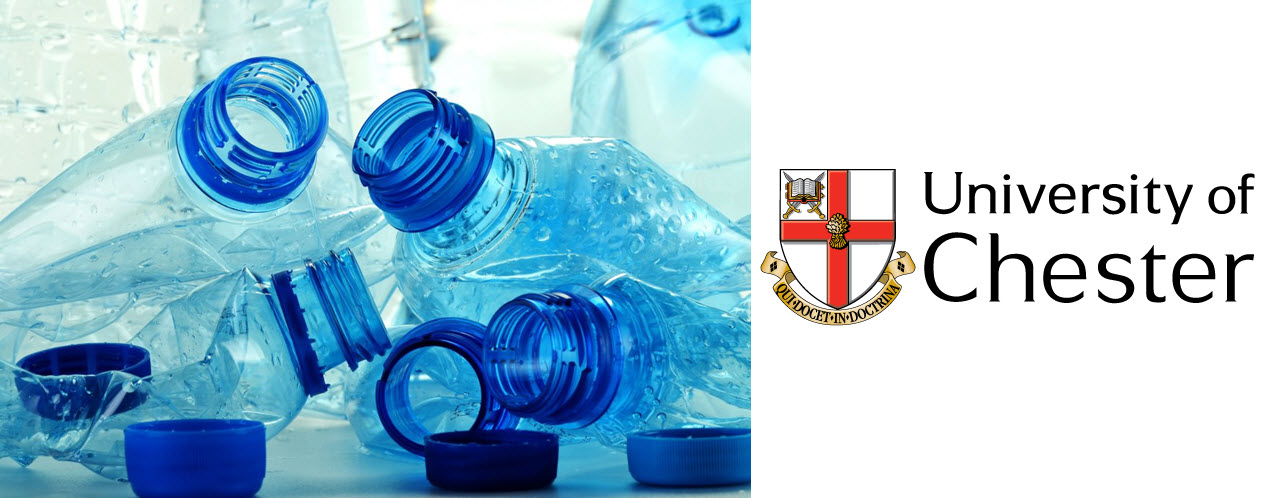
The University of Chester is joining the fight against plastic waste as it helps Powerhouse Energy PLC (AIM:PHE) DMG® and Waste2Tricity (W2T) to develop world-leading technology to turn unrecyclable plastic into low cost and low carbon hydrogen fuel and electricity.
The University of Chester’s Energy Centre at Thornton Science Park is working with PowerHouse Energy to ‘turn off the plastic tap into the ocean’ to ultimately clean it up. The innovative technology turns waste plastic into electricity and low-cost hydrogen, which can be used for transport fuel. The process takes all mixed waste plastic in an untreated unsorted contaminated form and requires no sorting or washing. This ground breaking technology has the potential to not only create a green fuel but to clean up plastic from the world’s oceans.
The technology developed by the University and Powerhouse Energy, over several years, currently demonstrates small scale conversion of plastic to hydrogen and electricity with zero plastic remaining. W2T are the exclusive developer in the UK and South East Asia including Japan and South Korea for the Powerhouse PLC DMG (distributes modular generation) for waste plastic to hydrogen and electricity.
W2T will soon develop a plant on the 54-acre Protos site near Ellesmere Port in Cheshire where they will produce low-cost and low-carbon hydrogen fuel and electricity which will help power the site. This is a first-of-a-kind on the site owned by Peel Environmental- part of Peel Holdings Land and Property.
W2T will then aim to roll out plants in SE Asia to clean up waste plastic and to monetise plastic via this highly efficient conversion system. This will enable W2T plants to buy in unrecyclable plastic waste in countries, such as Indonesia for $50 a ton. Therefore, dissuading the disposal of waste plastic in rivers and oceans.
Professor Joe Howe, Executive Director Thornton Energy Research Institute, University of Chester, said: “We are extremely excited to be hosting the prototype demonstrator here at the University of Chester. The technology converts all plastic waste into high quality, low carbon hydrogen syngas which can then be used to power gas engines. A by-product of this process is electricity, meaning waste plastic can not only fuel cars but can also keep the lights on at home. Surely the world must wake up to this technology. It will make waste plastic valuable with it being able to power the world’s towns and cities and most importantly it can help clean up our oceans of waste plastic now.”
About Waste2Tricity
Established in 2008, Waste2Tricity (W2T) has a vision to take our problem with plastic and create a solution. W2T is a project developer and operator in the energy-from-waste sector. In treating plastic as a fuel they believe that they can help limit contamination of our environment whilst creating a clean energy in the form of hydrogen.
Partnering with PowerHouse Energy (AIM PHE), W2T are the exclusive developer in UK and South East Asia including Japan and South Korea for the Powerhouse PLC DMG (distributed modular generation) for waste plastic to hydrogen and electricity. This technology is able to convert unrecyclable plastic into high-grade hydrogen for use as a transport fuel whilst also generating power for export by private wire or to the grid.
Waste2Tricity are currently working with EY London to raise funds. View information about Waste2Tricity‘s £1,000,000 fund raise here on their website.
PowerHouse Energy has developed a proprietary process technology – DMG® – which can utilise waste plastic, end-of-life-tyres, and other waste streams to efficiently and economically convert them into syngas from which valuable products such as chemical precursors, hydrogen, electricity and other industrial products may be derived. The PowerHouse technology is one of the world’s first proven, modular, hydrogen from waste (HfW) process.
The PowerHouse DMG® process can generate in excess of 1 tonne of road-fuel quality H2, and more than 58 MWh of exportable electricity per day.
The PowerHouse process produces low levels of safe residues and requires a small operating footprint, making it suitable for deployment at enterprise and community level.
PowerHouse is quoted on the London Stock Exchange’s AIM Market under the ticker: PHE, and is incorporated in the United Kingdom.
Read the most up to date Fuel Cell and Hydrogen Industry news at FuelCellsWorks




